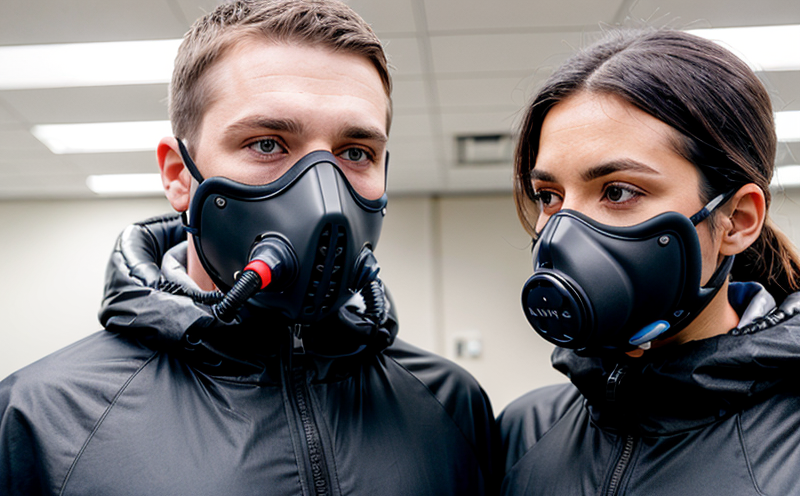EN 1827 Gas and Particle Combination Filter Testing
The EN 1827 standard specifies requirements for gas and particle combination filters used in respiratory protective devices. These filters are designed to protect the wearer from various harmful substances present in contaminated air, ensuring a safe working environment.
Respiratory protection testing is critical in occupational safety and health (OSH) compliance. The EN 1827 standard ensures that these combination filters meet the necessary performance criteria for both gas and particle filtration. This test assesses the filter's efficiency under various conditions, including pressure drop, breathing resistance, and flow rate.
The testing process involves subjecting the filter to a series of tests designed to evaluate its ability to remove specific gases and particles. The specimens are placed in a chamber where they encounter different concentrations of hazardous substances. The filter's performance is then measured against predefined acceptance criteria outlined in EN 1827.
For accurate testing, the specimen must be prepared carefully according to ISO standards. This includes ensuring that the filter is free from defects and properly mounted on a suitable holder. During testing, the apparatus simulates real-world conditions by applying various pressures and flow rates to mimic actual use scenarios.
The results of EN 1827 testing are crucial for verifying that the filters meet the necessary safety standards before being used in protective equipment. Compliance with these standards is essential for ensuring worker safety, especially in industries where exposure to harmful gases or particles is a risk.
It's important to note that the testing process includes rigorous quality control measures to ensure consistency and accuracy. These measures include regular calibration of instruments, standardization of test procedures, and validation of results against international standards such as ISO 9603-1:2005 for particle filtration efficiency tests.
The importance of EN 1827 testing cannot be overstated, especially in sectors where worker safety is paramount. By adhering to these standards, employers can ensure that their workers are protected against hazardous environments, thereby reducing the risk of injury or illness. This not only enhances operational efficiency but also contributes to a positive corporate reputation.
Real-world applications of EN 1827 testing include industries such as manufacturing, construction, and chemical processing, where employees may be exposed to various harmful substances. By ensuring that protective equipment meets the necessary safety standards, companies can create safer working environments and comply with regulatory requirements.
The test results provide comprehensive data on the filter's performance, including its efficiency in removing both gas and particle contaminants. This information is invaluable for quality managers, compliance officers, R&D engineers, and procurement teams who need to make informed decisions about purchasing and implementing protective equipment.
Eurolab Advantages
- Comprehensive Testing Capabilities: Eurolab offers a full range of testing services for respiratory protection equipment, including EN 1827 gas and particle combination filter testing.
- State-of-the-Art Facilities: Our modern laboratories are equipped with the latest technology to ensure accurate and reliable test results.
- Experienced Experts: Eurolab's team of highly qualified professionals brings extensive experience in occupational safety and health testing.
- Comprehensive Reporting: We provide detailed reports that are easy to understand, offering insights into the performance of your filters.
- Regulatory Compliance: Our services ensure compliance with international standards such as EN 1827 and other relevant regulations.
Why Choose This Test
The EN 1827 gas and particle combination filter test is essential for ensuring the safety of workers in various industries. By testing filters according to this standard, companies can guarantee that their employees are protected against harmful gases and particles.
The test evaluates the performance of these filters under a range of conditions, providing valuable data on their efficiency and reliability. This information is crucial for quality managers, compliance officers, R&D engineers, and procurement teams who need to make informed decisions about protective equipment.
Compliance with EN 1827 standards not only ensures worker safety but also helps companies meet regulatory requirements. By choosing this test, businesses can create safer working environments, enhance operational efficiency, and contribute to a positive corporate reputation.
The results of the EN 1827 test provide comprehensive data on the filter's performance, including its efficiency in removing both gas and particle contaminants. This information is invaluable for making informed decisions about purchasing and implementing protective equipment.
Moreover, the test ensures that the filters meet the necessary safety standards before being used in protective equipment. This not only enhances operational efficiency but also contributes to a positive corporate reputation by demonstrating commitment to worker safety.
International Acceptance and Recognition
- Australia: EN 1827 is recognized in Australia, ensuring compatibility with local regulations.
- New Zealand: The standard is widely accepted in New Zealand for respiratory protection equipment testing.
- United Kingdom: EN 1827 is the primary standard for gas and particle combination filter testing in the UK.
- European Union: As part of the EU, the standard ensures uniformity across member states.
- International Recognition: EN 1827 is recognized globally for its rigorous approach to respiratory protection equipment safety.





